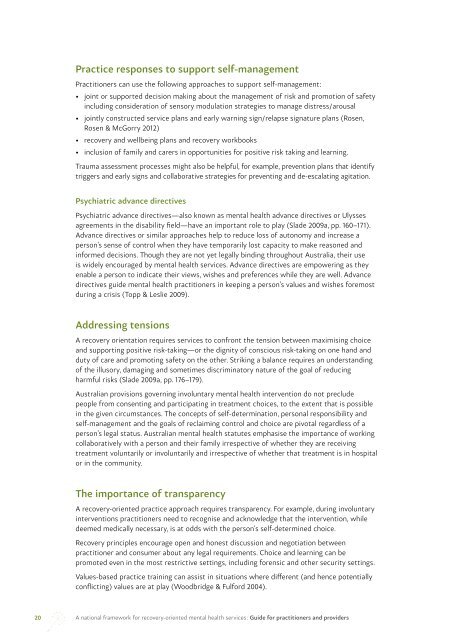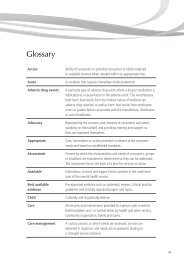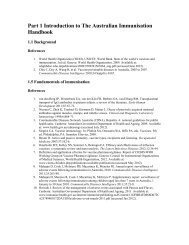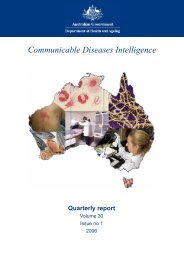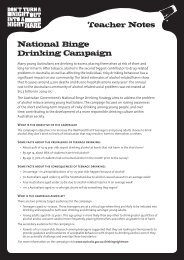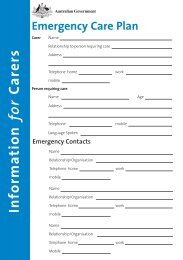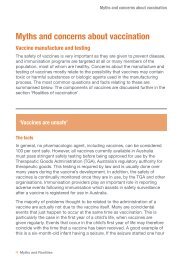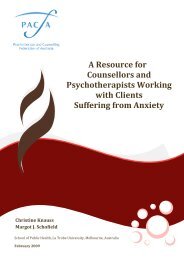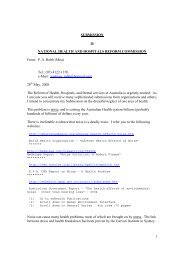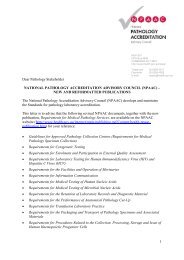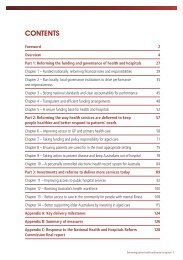6 Recovery, self-determination and safety
6 Recovery, self-determination and safety
6 Recovery, self-determination and safety
Create successful ePaper yourself
Turn your PDF publications into a flip-book with our unique Google optimized e-Paper software.
Practice responses to support <strong>self</strong>-management<br />
Practitioners can use the following approaches to support <strong>self</strong>-management:<br />
• joint or supported decision making about the management of risk <strong>and</strong> promotion of <strong>safety</strong><br />
including consideration of sensory modulation strategies to manage distress/arousal<br />
• jointly constructed service plans <strong>and</strong> early warning sign/relapse signature plans (Rosen,<br />
Rosen & McGorry 2012)<br />
• recovery <strong>and</strong> wellbeing plans <strong>and</strong> recovery workbooks<br />
• inclusion of family <strong>and</strong> carers in opportunities for positive risk taking <strong>and</strong> learning.<br />
Trauma assessment processes might also be helpful, for example, prevention plans that identify<br />
triggers <strong>and</strong> early signs <strong>and</strong> collaborative strategies for preventing <strong>and</strong> de-escalating agitation.<br />
Psychiatric advance directives<br />
Psychiatric advance directives—also known as mental health advance directives or Ulysses<br />
agreements in the disability field—have an important role to play (Slade 2009a, pp. 160–171).<br />
Advance directives or similar approaches help to reduce loss of autonomy <strong>and</strong> increase a<br />
person’s sense of control when they have temporarily lost capacity to make reasoned <strong>and</strong><br />
informed decisions. Though they are not yet legally binding throughout Australia, their use<br />
is widely encouraged by mental health services. Advance directives are empowering as they<br />
enable a person to indicate their views, wishes <strong>and</strong> preferences while they are well. Advance<br />
directives guide mental health practitioners in keeping a person’s values <strong>and</strong> wishes foremost<br />
during a crisis (Topp & Leslie 2009).<br />
Addressing tensions<br />
A recovery orientation requires services to confront the tension between maximising choice<br />
<strong>and</strong> supporting positive risk-taking—or the dignity of conscious risk-taking on one h<strong>and</strong> <strong>and</strong><br />
duty of care <strong>and</strong> promoting <strong>safety</strong> on the other. Striking a balance requires an underst<strong>and</strong>ing<br />
of the illusory, damaging <strong>and</strong> sometimes discriminatory nature of the goal of reducing<br />
harmful risks (Slade 2009a, pp. 176–179).<br />
Australian provisions governing involuntary mental health intervention do not preclude<br />
people from consenting <strong>and</strong> participating in treatment choices, to the extent that is possible<br />
in the given circumstances. The concepts of <strong>self</strong>-<strong>determination</strong>, personal responsibility <strong>and</strong><br />
<strong>self</strong>-management <strong>and</strong> the goals of reclaiming control <strong>and</strong> choice are pivotal regardless of a<br />
person’s legal status. Australian mental health statutes emphasise the importance of working<br />
collaboratively with a person <strong>and</strong> their family irrespective of whether they are receiving<br />
treatment voluntarily or involuntarily <strong>and</strong> irrespective of whether that treatment is in hospital<br />
or in the community.<br />
The importance of transparency<br />
A recovery-oriented practice approach requires transparency. For example, during involuntary<br />
interventions practitioners need to recognise <strong>and</strong> acknowledge that the intervention, while<br />
deemed medically necessary, is at odds with the person’s <strong>self</strong>-determined choice.<br />
<strong>Recovery</strong> principles encourage open <strong>and</strong> honest discussion <strong>and</strong> negotiation between<br />
practitioner <strong>and</strong> consumer about any legal requirements. Choice <strong>and</strong> learning can be<br />
promoted even in the most restrictive settings, including forensic <strong>and</strong> other security settings.<br />
Values-based practice training can assist in situations where different (<strong>and</strong> hence potentially<br />
conflicting) values are at play (Woodbridge & Fulford 2004).<br />
20<br />
A national framework for recovery-oriented mental health services: Guide for practitioners <strong>and</strong> providers


